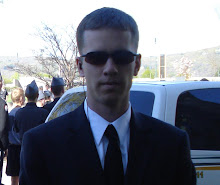Here's the end of my paper, where I stop writing about the book itself and focus instead on what really matters: why do I care about this "old dead general?"
I do not wish to provide any more overview or summary of General Marshall’s life or career, but rather to point out some of the things that I feel are relevant to my career and important for me to remember as I graduate and get commissioned. One of the first lessons that came to me is to stay in contact with higher-ranking officers from different points in your career. Throughout his time in the army, Marshall wrote to Superintendant Nichols of VMI, General Pershing, and a host of others. Good officers care about the development and advancement of their subordinates, and Marshall was not afraid to lean on that source of assistance when it became necessary to get something done. Use the connections you have when it is appropriate, and always keep in contact with your superiors, peers, and subordinates because you never know when they might be of help to you.
I have always been of the school of thought that my actions and merit should alone determine my promotions and recognitions. I am not comfortable using “connections” to get things that I want especially when it comes to positions. For the longest portion of Pogue’s book, he told the story of an officer who was content in taking the assignments and promotions given to him without ever making much of a fuss or asking for friends in high places to help him out. But the second big takeaway I have from reading about General Marshall is that a high-flying career can only go so far on merit alone. At some point the adage that “it’s not who you are but who you know” becomes true and you have to lean on your connections to make it higher on the rank ladder. Marshall might not have climbed as far on the ladder as he did had it not been for the friendship with and influence by General Pershing, who had considerable political weight in Washington that he threw around on behalf of his protégé. It pains me to say it and I am still not one hundred percent convinced that it is true, but in reading this book and others, it appears as if at some point in the career of an officer is less about what he has done and more about the friends he has in high places. So for me, if I stay in for any long period of time and wish to aspire to the ranks of the general officers (which is about as likely as pigs flying), I have to not only have a stellar career but I also have to spend time pressing flesh and working rooms when in the presence of people who have potential say in matters of promotions and staffing within the army.
The last thing that I take from the life of George Marshall, and a similar idea that I have taken from the life of Dwight Eisenhower, is that service to the nation does not end once you hang up the uniform. Marshall went almost immediately to serve as the Secretary of State, where he of course has considerable influence on the rebuilding of post-World War II Europe, the infamous Marshall Plan is of course credited to his name (nobelprize.org). One could say: once a public servant, always a public servant.
So is this a man that I would like to model my own life after? Absolutely, and I would like to think that I could even just begin to emulate George Marshall and all that he did for our nation. He was a dedicated soldier, a hard-working servant of the nation who did his time in the seldom-desired positions in the Army and was appropriately rewarded for his skill and hard work. The one thing I do worry about in studying men like Marshall, and this is a topic for an entire paper in itself, is whether or not he had a proper life outside of the military. He was married twice (his first wife died and then he remarried) and I do not get the feeling that he was able to pay appropriate attention to his role as husband and step-father. I suppose it is a question of goals and desires. Marshall clearly wanted to rise to the top and was prepared to sacrifice much of his life for that desire, but I am not that I share that desire.

No comments:
Post a Comment